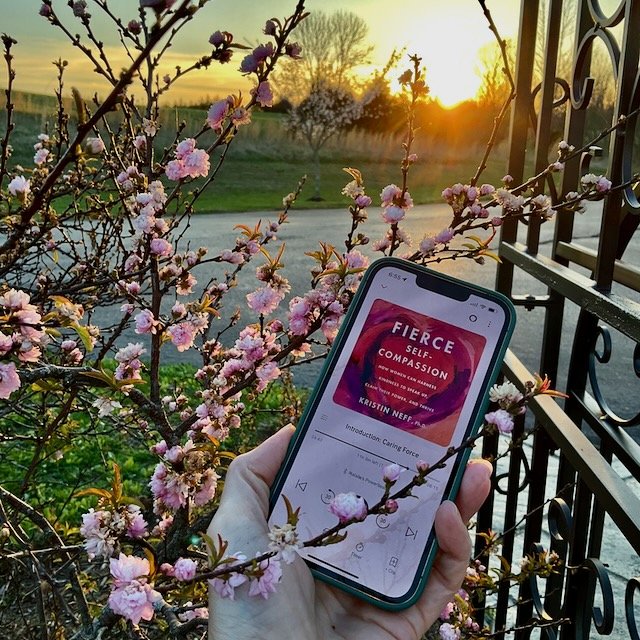Fierce Self-Compassion (by Kristin Neff)
I’m pretty sure I was introduced to Kristin Neff while utilizing the Calm app. I believe her work on self-compassion was referenced in a guided meditation. Given the source for this recommendation, I was intrigued and eventually purchased the audiobook from Audible.
I enjoy studying eastern philosophy, Buddhism and Hinduism. I have come to love teachers such as Ram Dass, Sharon Salzberg, Jack Kornfield, Tara Brach, Bob Thurman, Joseph Goldstein, and Thich Nhat Hanh. Sharon Salzberg is the pioneer of loving kindness aka compassion, which includes self-compassion. Given how much I connect to the teachings of these masters, I was sure I would enjoy Kristen Neff’s book, Fierce Self-Compassion: How Women Can Harness Kindness to Speak Up, Claim Their Power, and Thrive.
I had high hopes for Neff’s book when she mentioned most of the teachers mentioned above in the introduction. I have read their books, watched their YouTube videos, or participated in a retreat with those amazing teachers. Unfortunately, I couldn’t be more disappointed with this book.
Obviously, her book is geared towards women, which is great. I was turned off by her extreme feminism and that her delivery seemed like a lecture on the definition of feminism. I appreciate her attempts to encourage women to be empowered and her advocacy that all emotions, especially anger, are appropriate to express. At the same time, Neff spent an extraordinary amount of the book visiting all of the typical judgements men make towards women and their expression of anger.
Neff often incorporates mindfulness techniques and introduces various writing practices to promote fierce self-compassion. They seem okay. Most of her suggestions didn’t spark any interest for me to want to try them or add to the techniques I already practice. Prior to practicing most of the exercises, Neff consistently states a caveat of thinking of something not too difficult or utilizing a therapist with the exercise. I understand she is looking out for the reader and trying not to cause further harm with her techniques. This didn’t sync with my previous experiences with other books teaching personal growth. Her approach gave the impression that the reader should proceed with caution, rather than invest in a technique that may be a helpful, independent coping strategy.
This book was all over the place. The majority of the content was about extreme topics, as though she is using this book as a platform for the Me Too movement and to promote feminism. Part I of the book focused on very heavy content of sexual harassment/abuse rather than teaching the application of self-compassion. It felt like I was reading two different books at the same time. One book that promoted feminism and another book that offered techniques for practicing self-compassion. Actually, her approach to this topic contradicts lessons from the master teachers mentioned above. Eastern philosophy teaches equanimity; to not push away negative experiences nor grasp for positive experiences. (Which is extremely challenging.) Neff uses the word equanimity and talks about it in a chapter. I don’t perceive her as applying this concept well when she expresses her extreme feminism and political opinions. I make this point as someone who shares her opinions. I just don’t agree with her using a book on self-compassion as a platform for these opinions. I understand her intentions in how she chooses to apply equanimity, I just prefer other perspectives I have previously learned.
I keep thinking about Ram Dass’ puja table that he displayed in his home. His puja table contained items with spiritual significance and pictures of people he admired. The most unique aspect of his puja table included a picture of the presidential figure whose values and opinions he did not share. Ram Dass’ purpose in doing so was to develop love for the person’s soul so that he did not get caught in the negative thoughts about the personality.
Near the end of the book, Neff talked about relationships and the importance of women being independent and delivered the message that we don’t need a man in our life. Her delivery system of empowering single woman may be helpful for single women. For this married woman, it was off-putting. Then, it seemed as if she were ineffectively amending her point of view by addressing women in committed relationships. I sensed a great deal of judgment.
In closing, Neff’s work did not add anything to what I have learned. I will continue to study the teachings of the master teachers mentioned above. This book and her work is not for me.
Jean Ann Douglass, the audiobook narrator, did a great job.
As a participant in the Amazon Associates Program, I earn from qualifying purchases linked back to Amazon. Every penny earned allows me to blog about books and keeps this site running.


